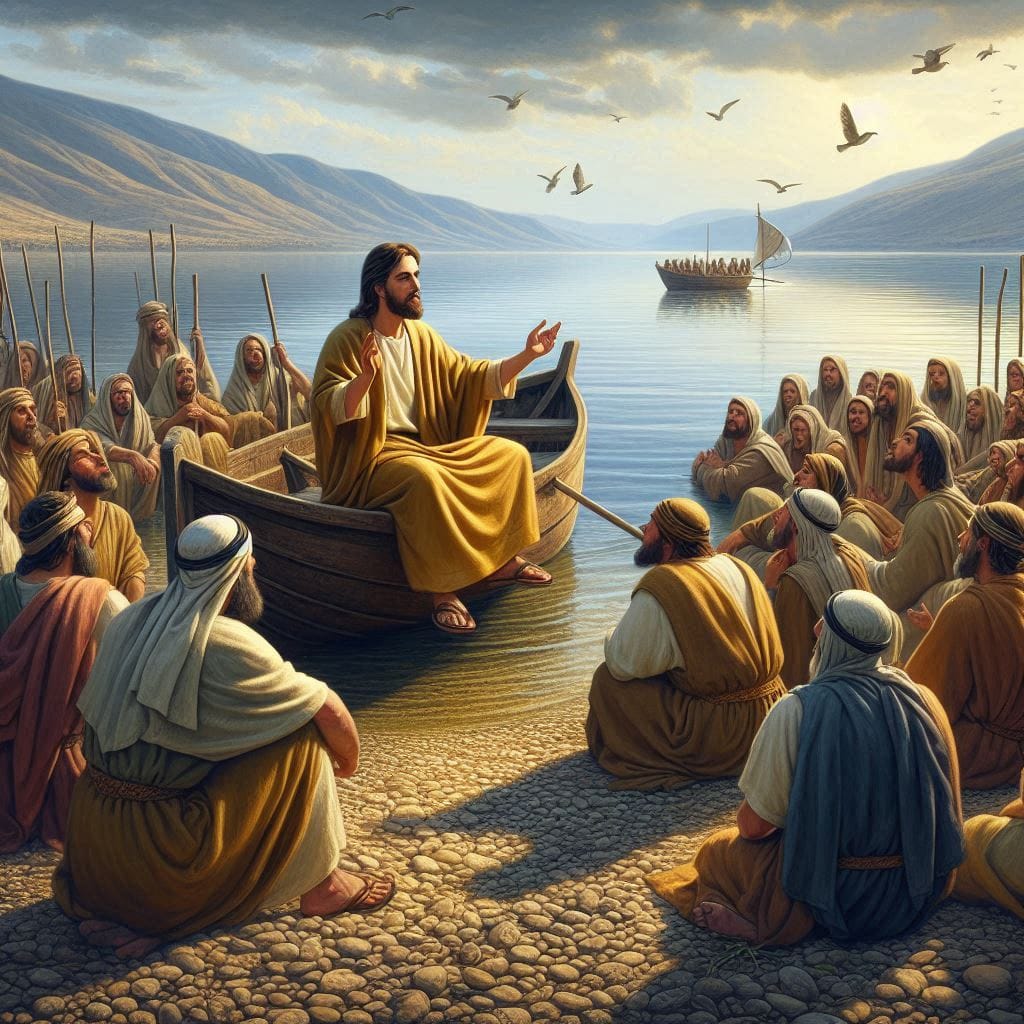11-16-24
Parables – why?
Yeshua used parables to teach. The disciples asked why. His answer has
been the cause of much discussion and misunderstanding.
To better understand his answer let us first define “parable”. A parable can
mean “riddle” or “mystery” but most commonly means “a fictitious
narrative of common life conveying a moral.” The parable is a story that
presents a context for a deeper meaning.
Yeshua’s answer as to why he taught in parables is found in Matthew.
Matthew 13:11 He replied, “Because the knowledge of the secrets of the
kingdom of heaven has been given to you, but not to them. 12 Whoever
has will be given more, and they will have an abundance. Whoever does
not have, even what they have will be taken from them. 13 This is why I
speak to them in parables:
“Though seeing, they do not see;
though hearing, they do not hear or understand.
14 In them is fulfilled the prophecy of Isaiah:
“‘You will be ever hearing but never understanding;
you will be ever seeing but never perceiving.
15 For this people’s heart has become calloused;
they hardly hear with their ears,
and they have closed their eyes.
Otherwise they might see with their eyes,
1
hear with their ears,
understand with their hearts
and turn, and I would heal them.’[a]
16 But blessed are your eyes because they see, and your ears because they
hear. 17 For truly I tell you, many prophets and righteous people longed
to see what you see but did not see it, and to hear what you hear but did
not hear it.
For many years I accepted the commonly held interpretation of this
passage that Yeshua used the parable so that those with a genuine desire
to learn from him the things of the Kingdom would be prompted to ask for
a deeper meaning while those that were scoffers or only curious or those
that were pursuing their own interests would go away thinking they had
heard a teaching of little value, a teaching so simple that it was beneath
them.
At least one biblical literary scholar has used this passage to teach that
Yeshua did not want to save everyone but only a select few and therefore
used parables as figures of speech to hide the meaning of his teaching to
the crowds.
Others have gone further to say that Yeshua was a Gnostic, a teacher of
secret knowledge to be shared with only a few worthy individuals. This is
patently not true (See Mark 4:21-22.)
Yeshua’s answer, as stated above, is found in Matthew, Mark and Luke. In
all three the question and answer are found immediately following the
parable of the sower although the question could have been asked after
any of the many parables that Yeshua taught. The question is placed here
because this particular parable contains the answer to the question.
Yeshua continues his answer;
2
Matthew 13:18 “Listen then to what the parable of the sower means: 19
When anyone hears the message about the kingdom and does not
understand it, the evil one comes and snatches away what was sown in
their heart. This is the seed sown along the path. 20 The seed falling on
rocky ground refers to someone who hears the word and at once receives
it with joy. 21 But since they have no root, they last only a short time.
When trouble or persecution comes because of the word, they quickly fall
away. 22 The seed falling among the thorns refers to someone who hears
the word, but the worries of this life and the deceitfulness of wealth choke
the word, making it unfruitful. 23 But the seed falling on good soil refers
to someone who hears the word and understands it. This is the one who
produces a crop, yielding a hundred, sixty or thirty times what was sown.”
In this parable the sower did not discriminate as to which soil received the
seed. The seed was good seed and consistant regardless of where it fell.
The impact of the message was determined not by the sower or the seed
but by the receiver of the message. This lays aside the interpretations of
predestined selection or gnostic teachings.
We are left with the good interpretation that the parable style of teaching
separated or filtered out the genuine seekers of truth from the scoffers,
merely curious or those who came out of their own self-interest.
But let us look at this parable of the sower a bit closer. It should be labeled
“the parable of the soils” for, as stated above, the sower sowed
indiscriminately and the seed was consistantly good seed. The soils are the
element that varies from hearer to hearer.
The parable stands on its own as a story of a farmer planting seed. Any
parable should stand logically on its own telling. This parable also conveys a
moral or truth about the Kingdom of Heaven, that truth being that all can
receive the message and that each hearer is responsible for what happens
to the seed, the message, after being received. But there is a third “truth”.
3
This parable is about – parables!
Yes, this parable and it’s explanation show why Yeshua chose to teach in
parables. He knew that the message about the Kingdom would not find a
home in the hearts of many that heard it. He knew that sharing the good
news of the Kingdom or any other teaching is best viewed as sowing seed
and waiting to see how much of the seed would sprout and grow and
produce a harvest. And so he was careful to plant seed that could be
accepted, simple truths that the scoffers could not deny. He gave the
people something that could be understood by any hearer. It was meant to
be a seed that has the potential to find a place in the hearts of the hearers.
For many that hear the message it is true;
“Though seeing, they do not see;
though hearing, they do not hear or understand.
The seed is taken away or lost before any understanding takes place.
they hardly hear with their ears,
and they have closed their eyes.
This is not a result of having heard a parable. Yeshua did not cause their
condition. It was and is their free will choice to close their eyes and ears.
Otherwise they might see with their eyes,
hear with their ears,
understand with their hearts
and turn, and I would heal them.’[a]
God, in Isaiah, and Yeshua, in Matthew, stand ready to heal. Salvation is the
objective for Yeshua. He did not tell a parable in order to put a roadblock in
front of the multitude. The roadblock is of their own doing.
4
Let us be aware that three of the four soils failed to produce a harvest. Not
all who retain the message will retain it to the end and protect it from being
choked out by the cares of the world. The fourth soil, the only one that
produces a crop, represents those who hear the word and understand it. If
we understand that the word, the message about the Kingdom of Heaven,
is a seed then we understand the the word must be nourished, protected
and cherished if it is to grow and multiply. After all, what is a “crop—a
hundred, sixty or thirty times what was sown” except a seed that has
multiplied?
And so, let us pray;
PRAYER OF THE GOOD SOIL
Heavenly Father, we honor your name. Your Kingdom has come, may every
knee bow. Let your will be done on earth as it is in heaven, let your will be
done in our lives as it is in heaven.
Thank you for the seed of your Kingdom, the word of God that you have
sowed into our hearts.
Do not let the evil one snatch away that seed.
Soften our hearts so that the seed, your word, can put down deep roots
that do not shrivel up and die when faced with adversity.
Remove from our lives and from our minds any concerns for the things of
this world, things that choke out the word and prevent it from healthy,
abundent growth.
Let your word dwell in our hearts, growing in understanding, gaining
strength through use. Let your word produce a harvest thirty, sixty, or even
a hundred times over as we share that word with others, planting seed in
their hearts. We pray this prayer for them also.
As yeast works its way through a batch of dough, let your Kingdom spread
5
throughout the world.
Thank you for allowing us to be a part of your Kingdom, working to share it
with others.
Amen
Listen to Yeshua,
DB
P.S. The remainder of Chapter 13 of Matthew contains several parables.
Each presents a simple truth that connot be denied by scoffers and each
contains a deeper meaning concerning the Kingdom of Heaven. And all of
them are meant to help us understand the parable of the sower because,
Mark 4:13 Then Jesus said to them, “Don’t you understand this parable?
How then will you understand any parable?”




